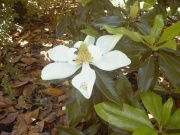Difference between revisions of "Dicotyledon"
Jump to navigation
Jump to search
(username removed) |
(username removed) |
||
| Line 6: | Line 6: | ||
== Synonyms and Related Terms == | == Synonyms and Related Terms == | ||
| − | + | dicotylédon (Fr.); dicotiledónea (Esp., Port.); dicotiledone (It.) | |
== Authority == | == Authority == | ||
| − | * | + | * Mary-Lou Florian, Dale Paul Kronkright, Ruth E. Norton, ''The Conservation of Artifacts Made from Plant Materials'', The Getty Conservation Institute, Los Angeles, 1990 |
* Wikipedia, the free encyclopedia, at http://www.wikipedia.com Comment: http://en.wikipedia.org/wiki/Dicotyledon (accessed Dec. 15, 2004) | * Wikipedia, the free encyclopedia, at http://www.wikipedia.com Comment: http://en.wikipedia.org/wiki/Dicotyledon (accessed Dec. 15, 2004) | ||
Revision as of 06:40, 24 July 2013
Description
A large class of flowering plants and trees whose seeds have two cotyledons or leaves. Examples of this type of plant are: cotton, flax, hemp, rubber tree. and most hardwood trees.
Synonyms and Related Terms
dicotylédon (Fr.); dicotiledónea (Esp., Port.); dicotiledone (It.)
Authority
- Mary-Lou Florian, Dale Paul Kronkright, Ruth E. Norton, The Conservation of Artifacts Made from Plant Materials, The Getty Conservation Institute, Los Angeles, 1990
- Wikipedia, the free encyclopedia, at http://www.wikipedia.com Comment: http://en.wikipedia.org/wiki/Dicotyledon (accessed Dec. 15, 2004)
